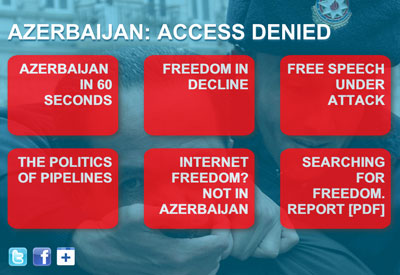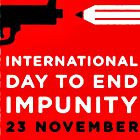Azerbaijan’s ruler fails to buy internet friends
The fact that Azerbaijan is hosting the Internet Governance Forum (IGF) may seem incongruous to many, not least Emin Milli and Adnan Hajizadeh, who in 2009 were jailed for 14 months ostensibly for disseminating a satirical video remarking on the suspiciously high price the government paid to import donkeys. However, the General Secretary of the International Telecommunications Union (ITU — a specialised UN agency that sets standards for international telephony) has thought about this carefully. Remarking on the role that social networks can play in the strengthening freedoms, Hamadoun Toure said:
The fact of 1 million Facebook users in Azerbaijan shows that the country is among the world leaders in this field.
Perhaps it is too easy to respond to these comments, breathlessly trumpeted in the state media, with a quick check on what Saudi Arabia‘s 5.8 million Facebook users might indicate for freedom in that country. When I was in Baku, one blogger told me that the internet in Azerbaijan is relatively open (at least to those with access, penetration remains low outside the cities), sites are not blocked and the authorities would encourage everyone to say everything online with the unfortunate caveat that it is all recorded and you may pay for your expression with a late night knock at door, your career terminated, or worse.

A Eurovision protest is crushed in Baku
These claims further demonstrate the Aliyev regime’s frustrating insistence on organising international events and thus opening up the country to examination, only to be baffled when not everyone is happy at the host’s questionable activities. In May 2012, Azerbaijan spent untold amounts of its oil profits on throwing a lavish Eurovision Song Contest only for party-pooping journalists and activists to kill the mood by publishing images of beaten protesters, impoverished citizens and the smoking ruins of houses bulldozed to make way for the Eurovision arena Crystal Hall. After the contest had finished and the circus had left town, presidential spokesman Ali Hasanov departed from the cuddly Eurovision script to recommend that “public hatred” should be directed towards the independent media that brought these issues to light.
Like other eccentric, lonely billionaires, president Ilham Aliyev seems to think that ostentatious displays of wealth lead to happiness. Azerbaijan’s money actually could buy happiness for the population if directed in the right way but instead it is lost in a black hole of corruption or funnelled into curious white elephant projects, culminating recently in the most audacious to date: a statue of former leader Heydar Aliyev in a park in Mexico City. Meanwhile the President’s children are blessed with multi-million dollar property portfolios, and the majority of Azerbaijanis struggle along.
My experience as a foreign journalist in Azerbaijan during Eurovision was bizarre from the moment I stepped off the plane. After being welcomed by some friendly young volunteers I was shepherded on to a large coach with Eurovision logos emblazoned on the side in which I was the sole passenger. I spent part of the journey along Heydar Aliyev Avenue, admiring the ubiquitous Heydar Aliyev posters and wondering why a large fence had been erected either side of the motorway. Some Azeribaijanis dryly termed this the “belt of happiness”, as it was clearly a flagrant attempt to conceal the sprawl of ramshackle houses beyond it.
The belt of happiness provides a useful metaphor of the Azerbaijani government’s constant clumsy attempts to conceal deep problems in the country with a gold sticker and hope that visiting observers and investors will not notice. The act of hosting the IGF does not mark you out as a pioneer of freedom any more than building a statue in Mexico endears you to Mexicans. Such moves can be used to fuel the gargantuan PR machine that says Azerbaijan is a stable, open-minded country to do business with, when in fact bribery and financial chicanery are endemic and teenagers are arrested for shouting the word freedom on the streets. However, Azerbaijan must be encouraged in its unquenchable thirst for partying and events if only to attract increased scrutiny to yet another repressive regime that exchanges oil for the silence of European politicians.



 Index on Censorship joined more than 40 global media organisations demanding governments, the United Nations and industry take action against violence towards journalists.
Index on Censorship joined more than 40 global media organisations demanding governments, the United Nations and industry take action against violence towards journalists.